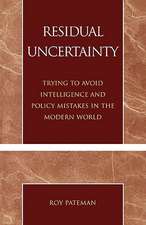Democratic Control of Intelligence Services: Containing Rogue Elephants
Autor Marina Caparini Editat de Hans Bornen Limba Engleză Hardback – 28 iun 2007
Preț: 1000.27 lei
Preț vechi: 1219.84 lei
-18% Nou
Puncte Express: 1500
Preț estimativ în valută:
191.43€ • 199.11$ • 158.03£
191.43€ • 199.11$ • 158.03£
Carte tipărită la comandă
Livrare economică 14-28 aprilie
Preluare comenzi: 021 569.72.76
Specificații
ISBN-13: 9780754642732
ISBN-10: 0754642739
Pagini: 326
Dimensiuni: 156 x 234 x 19 mm
Greutate: 0.45 kg
Ediția:1
Editura: Taylor & Francis
Colecția Routledge
Locul publicării:Oxford, United Kingdom
ISBN-10: 0754642739
Pagini: 326
Dimensiuni: 156 x 234 x 19 mm
Greutate: 0.45 kg
Ediția:1
Editura: Taylor & Francis
Colecția Routledge
Locul publicării:Oxford, United Kingdom
Notă biografică
Hans Born is Coordinator of the Working Group on Parliamentary Control of Armed Forces(PCAF), at DCAF, Switzerland. Marina Caparini is Coordinator of the Working Group on Internal Security and Civil Society at DCAF, Switzerland.
Recenzii
'The subject of intelligence accountability is of great importance for those who believe that a democratic nation’s secret agencies ought to be subject to safeguards designed to prevent their abuse of power...Born and Caparini have brought together a number of studies about the state of intelligence accountability in nations as varied as Romania, Poland, Bulgaria, France, Hungary, Norway, and the United States...' Loch K. Johnson, University of Georgia, USA 'This important volume examines the ways in which democratic jurisdictions operate accountability systems to ensure that their intelligence and security services comply with law and conform to public policy standards, even as they engage in combating international terrorism. Insightful case studies draw on the experiences of Western political systems, and detail the reforms instituted in transitional Eastern Europe to assert democratic controls over security intelligence agencies. Particular attention is devoted to the role of legislators and to privacy protection as elements of a framework of accountability for the governance of intelligence and security communities in democracies.' Martin Rudner, Carleton University, Canada 'One of the most interesting aspects of the book is the manner in which it tracks the impetus for reform, with major transformations happening either due to a transition to democracy (Czech Republic, Bulgaria, Romania), scandals (Norway, United States), or legal challenges (United Kingdom).' Survival 'This book contains excellent case studies on the reforms of Central and Eastern European as well as Western systems...One could be led to believe that this edited collection would suffer from chronic problems inherent in many collected works...but there is none of that...What's more, we must recognize that we are in the presence of a veritable tour de force in terms of comparative works on the issue of democratic accountability and control of intelligence agencies in spatial-temporal c
Cuprins
Part 1 Introduction; Chapter 1 Controlling and Overseeing Intelligence Services in Democratic States, MarinaCaparini; Chapter 2 The Need for Efficient and Legitimate Intelligence, FredSchreier; Part 2 Reforms in Eastern Europe; Chapter 3 Control and Oversight of Security Intelligence in Romania, Larry L.Watts; Chapter 4 Transformation of the Polish Secret Services: From Authoritarian to Informal Power Networks, AndrzejZybertowicz; Chapter 5 Reforming the Intelligence Services in Bulgaria: The Experience of 1989–2005, NikolaiBozhilov; Chapter 6 The Aftermath of 1989 and the Reform of Intelligence: The Czechoslovakian Case, Old?ich?erný; Part 3 Reforms in the West; Chapter 7 The United States Department of Defense Intelligence Oversight Programme: Balancing National Security and Constitutional Rights, George B.Lotz, II; Chapter 8 Checks and Imbalances? Intelligence Governance in Contemporary France, HansBorn, ThorstenWetzling; Chapter 9 Parliamentary Oversight of the Norwegian Secret and Intelligence Services, AmbassadorLeif Mevik, HakonHuus-Hansen; Part 4 Parliamentarians; Chapter 10 Parliamentary and External Oversight of Intelligence Services, HansBorn; Chapter 11 The UK’s Intelligence and Security Committee, IanLeigh; Chapter 12 Democratic and Parliamentary Accountability of Intelligence Services After 9/11, PeterGill; Part 5 Data Protection; Chapter 13 Public Oversight and National Security: Comparative Approaches to Freedom of Information, DavidBanisar; Chapter 14 Reconciliation and Developing Public Trust in Hungary: Opening State Security Files, LászlóMajtényi; Part 6 Conclusion; Chapter 15 Intelligence Services: Strengthening Democratic Accountability, HansBorn, FairlieJensen;
Descriere
This comprehensive volume discusses the various challenges of establishing and maintaining accountable and democratically controlled intelligence services, drawing both from states with well-established democratic systems and those emerging from authoritarian systems and in transition towards democracy.























